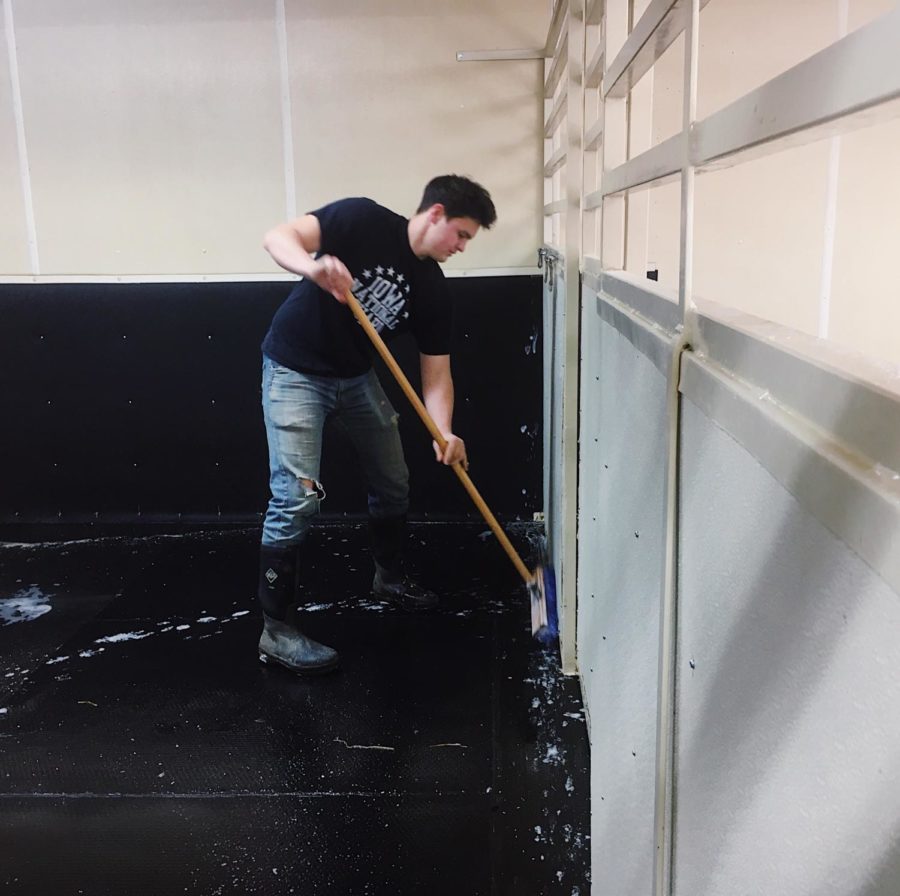Horse Barn: Behind the Scenes
February 28, 2018
If you go to Iowa State, you have probably seen the horses grazing on the north side of campus, or adorably nuzzling your hand if you are brave enough to pet them.
The happy and healthy horses that students love are living a fine life. But aside from the charming animals, something that the horses can’t thrive without seems to go unnoticed.
For the sake of these animals, some Iowa State students wake up at 6 a.m. daily to care for and attend to the horses.
The Equine Horse Barn houses around 32 horses. Every day, students clean out stalls, vaccinate horses and do many other feats.
But not only do the students help the animals be healthy and happy, they also gain a unique opportunity that’s not available to everyone.
“The farm is here basically doing what we’re teaching,” said Nikki Ferwerda, a lecturer, an adviser and manager of the horse barn. “The people that work here are doing those things instead of just reading about it in a chapter once.”
Ferwerda explained that not all students that go into agriculture are from rural areas with access to animals. The horse barn gives those students the association with the animals that they need.
“For a lot of our students, they have grown up in big cities or larger towns and dreamed about having horses,” Ferwerda said. “Some of them have their own horses at home, but more and more have no horse experience until they get here.”
In fact, Andrew Riehl, a senior in animal ecology, is one of those students that did not grow up on a farm.
“It wasn’t until I got here that I started working with horses,” Riehl said. Raised in Wisconsin, he worked around horses in high school but had no experience with the animals prior to coming to Iowa State.
Jess Heine, a junior in animal science, grew up on a farm with horses and sheep but is still learning more working here than she ever did at her farm. Heine said that she had no experience around stallions, and the horse barn here is teaching her a lot about how to treat a stud.
Even with a background in farming and horses, Heine supports the idea that knowledge can always expand. Learning more and more every day, the students working in the horse barn are gaining experience as well as networking and meeting important people.
“If you get involved with what you are interested in and you make connections with people it’s pretty easy to find a spot,” Heine said.
The variety in chores that the students do is another factor that expands their career opportunites. Each student has a specific aspect that they focus on.
“I am in charge of vaccinations and health stuff like that,” Heine said.
Recently, Heine just vaccinated an adult horse, Shirley. She explained that medicating the horses is a heavy responsibility, because possibly over or under-medicating a horse can potentially be very hazardous.
In the winter, when it is extremely cold, Heine has to be careful to make sure that the shots don’t freeze. As a precaution, she insulates the shots and covers them on her way out to the horse.
For Riehl, with three years of experience at the horse barn, his ever-changing tasks still keep him on his toes.
“There’s a lot of different projects,” Riehl said. “There are different tasks every day that need to be done.”
Whether it’s scrubbing a stall or walking a horse, Riehl appreciates the experience that he is constantly gaining at the barn.
“It’s a hands-on kind of work that I like,” Riehl said.
The behind the scenes hard work that the students do for the horses never stops. If the chores are not started early, the students could end up staying at the barn a lot later than planned.
“There are so many horses here that if you don’t start chores early, you could be here really late,” Heine said.
Even though the dedication is constant, the employees at the horse barn still manage to keep everything running smoothly and safely.
“Every day we feed the horses, every day we clean the stalls, every day we worry about their health, well-being and well-fare,” Ferwerda said.
















